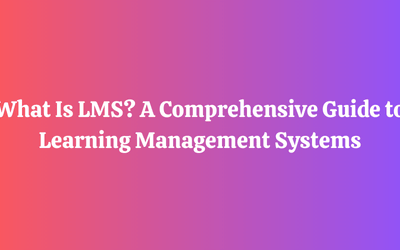What Types of LMS are there?
So many types of Learning Management System, or LMS, exist . They are currently used by organizations primarily to manage e-learning and deliver course materials to employees. All these systems have a common mechanism. It is to manage and administer a training to a large and sometimes scattered workforce. In the selection of an LMS, it’s highly important for an organization to understand how it plans to deliver training materials to its trainees. The organizational needs should be mapped onto an LMS that offers the required features.
Free vs. Commercial
So there is an open-source platform and a commercial platform. Free or open-source has an open source code. Therefore, you can easily modify the platform and make it customizable for your organization. However, most of the free LMS products are highly complicated. Compared with the commercial products and lack a reliable support-system in place.
This can be a nuisance since making even small changes can be difficult for a novice user. The only sort of support available in the form of online forums or a separate paid support service. On the other hand, Commercial software, offers a support staff, is easier to deploy and use. The main types of commercial LMS products are Hosted or the (SaaS) service-based cloud solution.
On-Cloud vs. Hosted
A main functionality of the LMS is its scalability. Commercial LMS are typically sold in two ways. It can either be a locally hosted enterprise product, hosted on an organization’s own servers. Or as an on-cloud offering, where the hosting is on the vendor’s servers. Generally, it is accessible from anywhere as the data is stored on “the cloud”. SaaS LMS offer trainers more flexibility in terms of scaling up or down. Since the LMS is sold as a “service”, systems upgrades, freeing up bandwidth, and IT support is provided by the vendor. This is, in contrast, imposing the dependency on the customer.
Data is not stored on local servers so scalability is never a concern, plus most SaaS LMS can handle any user load if there is a sudden spike in the number of users there is no break-down during peak time. In a Hosted LMS, the users can individually customize their LMS. The organization’s IT staff can administer the platform, handle support, personalization and scalability concerns, so the infrastructure setup, maintenance, upgrading and branding costs are dependent on the customer end.
Content Creation Capability
Another functionality of an LMS that should be considered is whether it can create training content. In few cases, an LMS acts simply as a content distribution tool, which must be created in a Learning Content Management System elsewhere. Nevertheless, some LMS systems, such as the ATUM LMS, have inbuilt authoring tools that allow trainers and designers to develop their own unique content.
Stratbeans also offers separate course-creation tools for purchase and even customized course materials. Stratbeans offers also course materials that adheres to international SCORM standards which also comply with the ATUM LMS. At Stratbeans we make sure the course material are set at this standard are readable by any other SCORM-compliant software.
Integration Capabilities
LMS systems are progressing, such as their ability for the system to integrate with other applications your organization already uses such as internal calendars, emails, or social networks like Facebook and Twitter. Usually organizations require their HRMS data or PMS data to be integrated with the LMS from a reporting perspective and with readily available APIs – this is possible with the ATUM LMS that to without any integration efforts / customizations.
Therefore, Stratbeans provides Single-Sign On (SSO) capabilities to organization that want to go for an integration with a third-party software with the LMS. Depending on your organization’s needs, you may pay attention to a LMS that supports this integration.
So understand your organization’s plans of rolling out its online training and e-learning initiative; keeping in mind the flexibility your organization will require in the future. With this you can begin to narrow down the types of LMS existing in the market for your organization!
For a free consultation or a demo; kindly contact us here!
Our News
- AI
- Animations
- Articulate
- Articulate 360
- Articulate Engage
- Articulate Live
- Articulate Presenter
- Articulate Quizmaker
- Articulate Replay
- Articulate Review
- Articulate Storyline
- Articulate Storyline 3
- Articulate Studio
- bite sized learning
- Characters
- Content Library
- Corporate Communication
- E-Learning
- e-Learning Authoring Tools
- Employee Engagement
- Game-Based Learning
- Gamification
- Gamiflexer
- Go Sales
- Healthcare
- Instructional Design
- Interactivity
- Knowledge Transfer
- L&D Trends
- Learning
- Learning & Development
- Learning Experience platform
- Learning Management System
- LMS
- LXP
- Microlearning
- mLearning
- Mobile Learning
- Nugget Learning
- Online Training
- Peek
- Performance Support
- Preso
- Quiz and Assessment Platform
- Replay 360
- Rise
- SCORM
- Screen Capture
- Software
- Storyline 360
- Studio 360
- Training Management
- Trainings
- Uncategorized




